Matthew Thorburn, Poet - Author of Dear Almost
Menu
Books and Chapbooks
Matthew Thorburn’s books and chapbooks are available from Amazon, Barnes & Noble, select local booksellers or directly from the publishers. If you'd like a signed copy or are interested in a title that's out of print, please reach out via the Contact page.
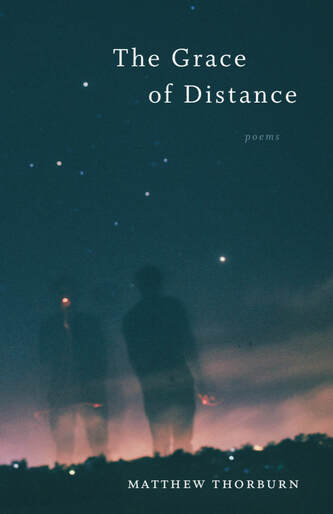
The Grace of Distance
Louisiana State University Press, 2019
Finalist for the Paterson Poetry Prize
“Matthew Thorburn’s considerable poetic gifts bring the actual world joyfully alive in these poems. But this isn’t simple joy; it’s joy in conversation with the mounting losses and complexities of middle age. “I can’t remember,” he writes, “if I’ve only just arrived / or it’s time for me to go.” In his ekphrastic poem about The Girl with a Pearl Earring (painted in Vermeer’s middle age), Thorburn writes, “Vermeer did // what we all want to do: make time stop / so we can see.” And that is what this book succeeds, beautifully, in doing—stopping time so we can see."
—Leslie Harrison
“...What Thorburn’s poetry does best—engage the world with a serious attention and imagination, call into 'that dark glitter,' and listen for a response."
—Hannah Vanderhart, The Adroit Journal
“In his elegant new collection of poems, Matthew Thorburn mines the lyric possibilities of mid-life in loss and love and aliveness. This poet’s lyric distances are dreamy and worldly, wise and full of surprises."
—Elaine Sexton
Louisiana State University Press, 2019
Finalist for the Paterson Poetry Prize
“Matthew Thorburn’s considerable poetic gifts bring the actual world joyfully alive in these poems. But this isn’t simple joy; it’s joy in conversation with the mounting losses and complexities of middle age. “I can’t remember,” he writes, “if I’ve only just arrived / or it’s time for me to go.” In his ekphrastic poem about The Girl with a Pearl Earring (painted in Vermeer’s middle age), Thorburn writes, “Vermeer did // what we all want to do: make time stop / so we can see.” And that is what this book succeeds, beautifully, in doing—stopping time so we can see."
—Leslie Harrison
“...What Thorburn’s poetry does best—engage the world with a serious attention and imagination, call into 'that dark glitter,' and listen for a response."
—Hannah Vanderhart, The Adroit Journal
“In his elegant new collection of poems, Matthew Thorburn mines the lyric possibilities of mid-life in loss and love and aliveness. This poet’s lyric distances are dreamy and worldly, wise and full of surprises."
—Elaine Sexton
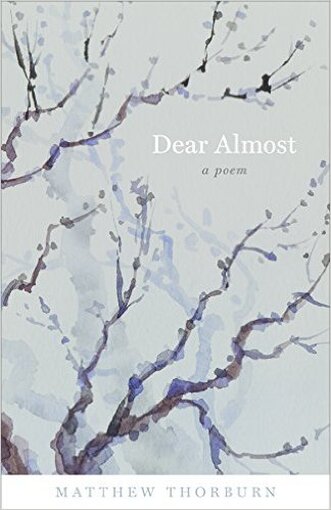
Dear Almost
Louisiana State University Press, 2016
Winner of the Lascaux Prize
“Like a modern-day Basho, Matthew Thorburn travels on a year-long journey through grief over the ‘almost girl’ he and his wife lose to miscarriage. Here, in artful, haibun-like free verse, the timely and timeless merge: geese are sucked into an Airbus engine, forcing an emergency landing; the poet contemplates the moon as he carries out a bag of garbage in the Bronx. The result is clear, mysterious, original, and ultimately hope-filled. Dear Almost might be the truest poem about miscarriage I’ve ever read.”
—Katrina Vandenberg
“A book-length poem that is clear, yet nuanced and subtle in its use of imagery and implied metaphor, compassionate and graceful in its grief, and marvelous in its myriad of arrangements and structures. . . . Dear Almost displays disarming courage that I hope can be contagious.”
—Sean Delgado, StorySouth
Louisiana State University Press, 2016
Winner of the Lascaux Prize
“Like a modern-day Basho, Matthew Thorburn travels on a year-long journey through grief over the ‘almost girl’ he and his wife lose to miscarriage. Here, in artful, haibun-like free verse, the timely and timeless merge: geese are sucked into an Airbus engine, forcing an emergency landing; the poet contemplates the moon as he carries out a bag of garbage in the Bronx. The result is clear, mysterious, original, and ultimately hope-filled. Dear Almost might be the truest poem about miscarriage I’ve ever read.”
—Katrina Vandenberg
“A book-length poem that is clear, yet nuanced and subtle in its use of imagery and implied metaphor, compassionate and graceful in its grief, and marvelous in its myriad of arrangements and structures. . . . Dear Almost displays disarming courage that I hope can be contagious.”
—Sean Delgado, StorySouth
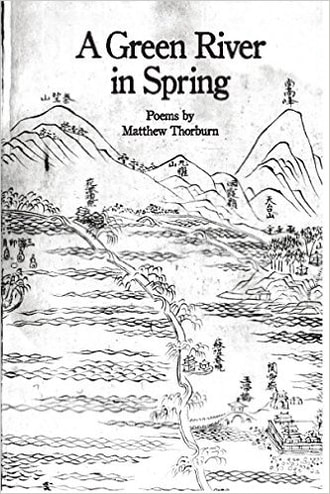
A Green River in Spring
Autumn House Press, 2015
Winner of the Coal Hill Review Chapbook Competition
OUT OF PRINT
“Never (or so I’m tempted to claim) has delicacy been so palpable as in the poems that make up Matthew Thorburn’s chap collection, A Green River in Spring. The author says ‘the first spark’ for many of the poems came from reading classical Chinese and Japanese poetry. Thorburn retains much of what’s wonderful about the sources—imagery, the link to nature, the meticulous placement of words, a deftness….”
—Eileen Tabios, Galatea Resurrects
“Matthew Thorburn invites us to inhabit his exquisitely drawn landscapes inspired by the Tang Dynasty poets. In this fully-realized world, people don’t just believe in magic, they experience it firsthand: the Taoist who hitches a ride with a crane to get to heaven, the emperor who sips dew to prolong his life, the boy who falls down a well and emerges in Mongolia, ‘whispering through his fever of the vast, star-clotted sky he swam beneath.’ These poems create a world very different than our own, and yet we recognize it as if we are remembering a dream.”
—Michael Simms
Autumn House Press, 2015
Winner of the Coal Hill Review Chapbook Competition
OUT OF PRINT
“Never (or so I’m tempted to claim) has delicacy been so palpable as in the poems that make up Matthew Thorburn’s chap collection, A Green River in Spring. The author says ‘the first spark’ for many of the poems came from reading classical Chinese and Japanese poetry. Thorburn retains much of what’s wonderful about the sources—imagery, the link to nature, the meticulous placement of words, a deftness….”
—Eileen Tabios, Galatea Resurrects
“Matthew Thorburn invites us to inhabit his exquisitely drawn landscapes inspired by the Tang Dynasty poets. In this fully-realized world, people don’t just believe in magic, they experience it firsthand: the Taoist who hitches a ride with a crane to get to heaven, the emperor who sips dew to prolong his life, the boy who falls down a well and emerges in Mongolia, ‘whispering through his fever of the vast, star-clotted sky he swam beneath.’ These poems create a world very different than our own, and yet we recognize it as if we are remembering a dream.”
—Michael Simms
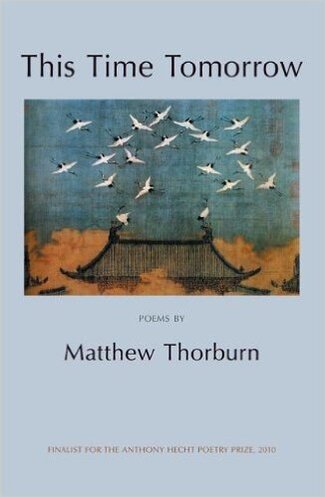
This Time Tomorrow
Waywiser Press, 2013
Finalist for the Anthony Hecht Poetry Prize
OUT OF PRINT
“Matthew Thorburn’s This Time Tomorrow is a series of travelogues that are simultaneously internal and external. Though the poems are set in Iceland, Japan and China, and rich with fresh imagery of those places, his real subject is ‘the built-in sadness of travel,’ with ‘sadness’ conjuring the innate interiority of being in foreign lands. In a voice that is inventive, natural, honest and always clear, Matthew Thorburn has given us an exciting extended meditation on what it means to study the ever-surprising geography of one’s own mind.”
—Chase Twichell
This Time Tomorrow offers “a poetry of narration, sudden incongruities, and games of association…. The jump-cut is the book’s most dependable device. The habit of moving in and out of the present narrative, to some associated thought or some earlier event, is a good tool for insinuating the traveler’s permanent sense of unease. The long poem ‘Something to Declare’ is especially virtuosic….’”
—Maryann Corbett, Rattle
Waywiser Press, 2013
Finalist for the Anthony Hecht Poetry Prize
OUT OF PRINT
“Matthew Thorburn’s This Time Tomorrow is a series of travelogues that are simultaneously internal and external. Though the poems are set in Iceland, Japan and China, and rich with fresh imagery of those places, his real subject is ‘the built-in sadness of travel,’ with ‘sadness’ conjuring the innate interiority of being in foreign lands. In a voice that is inventive, natural, honest and always clear, Matthew Thorburn has given us an exciting extended meditation on what it means to study the ever-surprising geography of one’s own mind.”
—Chase Twichell
This Time Tomorrow offers “a poetry of narration, sudden incongruities, and games of association…. The jump-cut is the book’s most dependable device. The habit of moving in and out of the present narrative, to some associated thought or some earlier event, is a good tool for insinuating the traveler’s permanent sense of unease. The long poem ‘Something to Declare’ is especially virtuosic….’”
—Maryann Corbett, Rattle
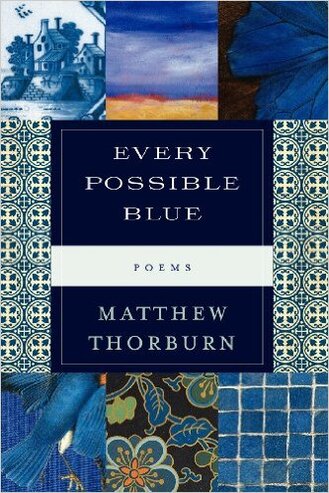
Every Possible Blue
CW Books, 2012
OUT OF PRINT
“Saturated with color and light, [Every Possible Blue] celebrates New York with deft, vivacious strokes. Similar to the way a city is always rebuilt, or a painter reworks a canvas, Thorburn’s poems pay special attention to the clothing and adornments that change to fit life’s varied occasions.”
-Publishers’ Weekly
“If Fred Astaire could write, it might sound like this: practiced, complex, graceful. Thorburn’s grief is here but it is his secret; instead he writes of game changing moments that make him happy.... These are a sequence of anecdotes daring to love again, dreaming in daylight.”
—Grace Cavalieri, The Washington Independent Review of Books
CW Books, 2012
OUT OF PRINT
“Saturated with color and light, [Every Possible Blue] celebrates New York with deft, vivacious strokes. Similar to the way a city is always rebuilt, or a painter reworks a canvas, Thorburn’s poems pay special attention to the clothing and adornments that change to fit life’s varied occasions.”
-Publishers’ Weekly
“If Fred Astaire could write, it might sound like this: practiced, complex, graceful. Thorburn’s grief is here but it is his secret; instead he writes of game changing moments that make him happy.... These are a sequence of anecdotes daring to love again, dreaming in daylight.”
—Grace Cavalieri, The Washington Independent Review of Books
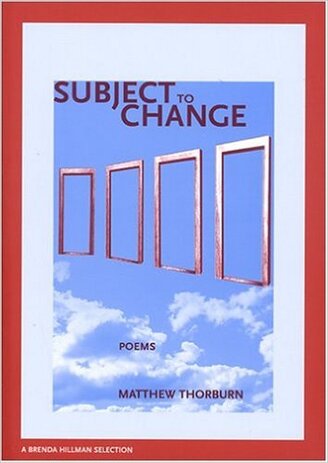
Subject to Change
New Issues Poetry & Prose, 2004
Winner of the New Issues Poetry Prize
OUT OF PRINT
“Wallace Stevens once said that poets must love words with all their power to love anything at all. Few first books show as much pleasure in words as Matthew Thorburn’s Subject to Change.”
—Stephanie Burt, The New York Times Book Review
“The examination of personal nostalgia resonates throughout Matthew Thorburn’s Subject to Change, and this underlying thread of sadness and remorse and hopeful expectation—a quest for what might have been and might yet be—makes the emotional edge of these poems burn with brilliant clarity.”
—Matthew W. Schmeer, Verse
New Issues Poetry & Prose, 2004
Winner of the New Issues Poetry Prize
OUT OF PRINT
“Wallace Stevens once said that poets must love words with all their power to love anything at all. Few first books show as much pleasure in words as Matthew Thorburn’s Subject to Change.”
—Stephanie Burt, The New York Times Book Review
“The examination of personal nostalgia resonates throughout Matthew Thorburn’s Subject to Change, and this underlying thread of sadness and remorse and hopeful expectation—a quest for what might have been and might yet be—makes the emotional edge of these poems burn with brilliant clarity.”
—Matthew W. Schmeer, Verse
